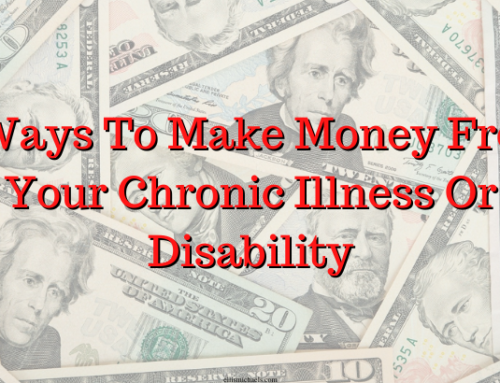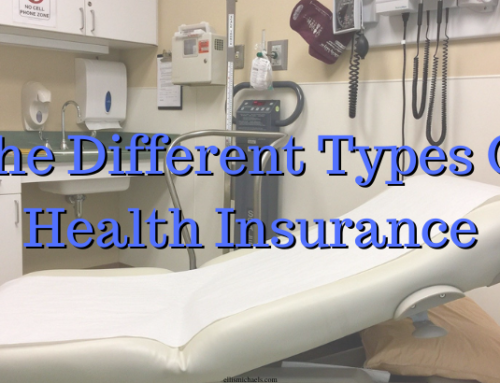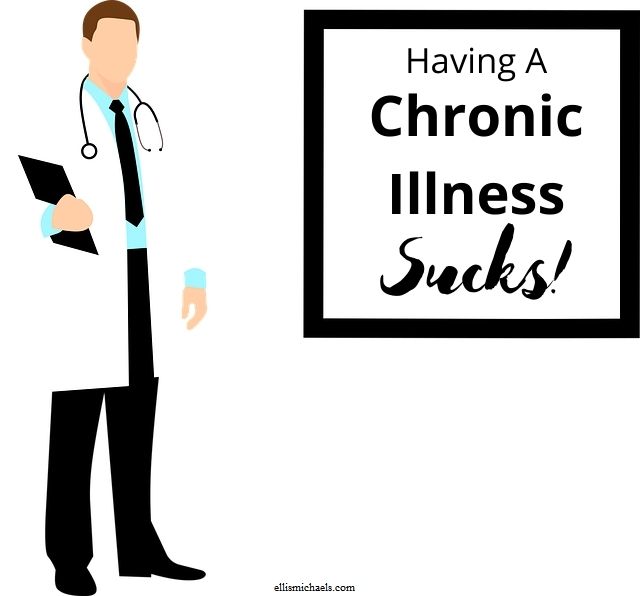There’s no question about it: the medical system in the United States is broken. That’s why it’s so important for people living with chronic illnesses to play an active role in their own healthcare. Chronic illness self-management is all about doing just that.
In this article, we’re going to look at some self-management techniques for people living with chronic medical conditions. The more active of a role you play in your own care, the better your outcome will likely be.
Chronic Illness Self-Management
Table of Contents
I was diagnosed with Behcet’s disease when I was just sixteen years old. And even at that young age, it was obvious to me that the medical system isn’t really designed to help people living with chronic illnesses. It’s designed to patch up symptoms and send you on your way: that’s it. After getting diagnosed, I quickly realized that I would need to take control of my own healthcare if I wanted to live a decent life.
That was twenty-four years ago that I was diagnosed. I’ve been self-managing my chronic disease ever since. And I can definitely say that chronic illness self-management has made the difference between living the miserable life I had and the awesome life I have. So, what is chronic illness self-management?
Chronic illness self-management is when you, the patient, take control of your own healthcare. Now, that doesn’t mean you stop going to the doctor or stop taking your meds. It means you get in the driver’s seat of your own healthcare so you can live the best life possible you possibly can.
When you self-manage your chronic illness, you put yourself in the best possible position to live a decent life. You’re in control: your diagnosis is not. By using the chronic illness self-management tools we’re about to discuss, you never have to feel powerless over your disease ever again.
Chronic Illness Self-Management Tools
Education
This is the number-one tool in your chronic illness self-management toolbox. The more you know about your diagnosis, the better off you’ll be. Educating yourself about your disease is the single best thing you can do to improve your outcome.
When I was first diagnosed with Behcet’s, I was in denial. I didn’t want to believe I had a chronic disease. But I eventually got my head out of the sand and accepted it. When I did, I started to ferociously research my diagnosis. And I’ve been studying Behcet’s disease (and health/medicine in general) ever since.
 If you’re living with a rare illness, educating yourself about it is even more important than if you’re living with one of the more common chronic illnesses like diabetes, arthritis, heart disease, or asthma, for example. But if you’re living with a rare illness like Behcet’s, systemic lupus erythematosus (lupus), Churg-Strauss, multiple sclerosis (MS), Guillain-Barre, or one of the other many less-common diseases, education is extremely important. Why? Because you’re learning for two.
If you’re living with a rare illness, educating yourself about it is even more important than if you’re living with one of the more common chronic illnesses like diabetes, arthritis, heart disease, or asthma, for example. But if you’re living with a rare illness like Behcet’s, systemic lupus erythematosus (lupus), Churg-Strauss, multiple sclerosis (MS), Guillain-Barre, or one of the other many less-common diseases, education is extremely important. Why? Because you’re learning for two.
You may have to educate not only yourself, but also your doctor(s) if you have a rare disease. Most of the doctors I’ve been to over the years have seen very few, if any, patients with Behcet’s disease. Generally, they know very little about my diagnosis. So I often have to educate them about certain aspects of my illness. In my experience, most doctors and other healthcare providers have been very cooperative. They’re happy to learn and respect that I’ve taken the time to educate myself about my illness.
So, how do you go about educating yourself? There are a number of ways to learn about your diagnosis and health in general. Personally, I love the written word. I’ve always been an avid reader. So my preferred way to consume information is by reading. Even if your diagnosis is super rare, there have probably been at least one-or-two books written about it. There might even be blogs dedicated to it. If you like to read, look for books and websites about your illness and about general health.
 But a lot of people don’t share my love of reading – and that’s okay. You can also educate yourself by watching videos and listening to audio. Between YouTube and the other video platforms out there, I’m sure you can find plenty of videos about your diagnosis. And there are countless podcasts and lectures out there, many of which are dedicated to chronic illnesses and health in general.
But a lot of people don’t share my love of reading – and that’s okay. You can also educate yourself by watching videos and listening to audio. Between YouTube and the other video platforms out there, I’m sure you can find plenty of videos about your diagnosis. And there are countless podcasts and lectures out there, many of which are dedicated to chronic illnesses and health in general.
Another way to educate yourself is what we’re going to talk about in the next section. Connecting with other people living with the same chronic illness as you can be a great way to learn more about it.
Connection
To self-manage your chronic disease, you’re going to need to connect with others. Connection is one of the most important aspects of chronic illness self-management. With or without a chronic illness, it’s essential to our mental health that we connect with others. We all need social support whether we want to admit it or not.
 I like to think of myself as a lone wolf. It sounds kind of silly when I say that out loud, but it’s true. I’ve always valued my independence. I don’t like others to depend on me and I don’t like having to depend on others. But sometimes, especially for those of us living with a chronic illness, it’s necessary.
I like to think of myself as a lone wolf. It sounds kind of silly when I say that out loud, but it’s true. I’ve always valued my independence. I don’t like others to depend on me and I don’t like having to depend on others. But sometimes, especially for those of us living with a chronic illness, it’s necessary.
For the first few years after I was diagnosed, I didn’t tell anyone about my illness. I was ashamed and embarrassed. But, even more, I was lonely. I was too afraid to reach out to anyone and I often felt like the only person on the planet with a rare disease. Man, was I wrong. There are literally millions of us.
Don’t be afraid to reach out to others. Whether it’s friends and family or people you meet online, you need to put yourself out there. I know it’s hard for some people. It was certainly hard for me at first. But now I have a wonderful support system made up of friends, family, healthcare providers, other people with Behcet’s, and other people with different chronic illnesses.
By connecting with others, first and foremost, you’ll feel less alone. Just knowing that you have people to talk to and share your experiences with will make a world of difference. But connecting with others can also be a great way to educate yourself. Learn from other people who share your diagnosis or live with a different chronic disease.
 So, where can you connect with others who have the same diagnosis as you? One of the best places to find others with your illness is online support groups. Facebook, Reddit, and other social media platforms have countless communities of people living with every disease you can think of. Even if you have a rare diagnosis like me, you should be able to find at least one-or-two groups to join. Behcet’s is very rare yet there are several Facebook groups for people diagnosed with it, some with over 1,000 members.
So, where can you connect with others who have the same diagnosis as you? One of the best places to find others with your illness is online support groups. Facebook, Reddit, and other social media platforms have countless communities of people living with every disease you can think of. Even if you have a rare diagnosis like me, you should be able to find at least one-or-two groups to join. Behcet’s is very rare yet there are several Facebook groups for people diagnosed with it, some with over 1,000 members.
In addition to groups about your specific diagnosis, there are also tons of great groups for people living with any chronic medical condition. I’m a member of several chronic illness groups on Facebook and they’re all wonderful. And if you live in or near a big city, you might be able to find in-person support groups, as well. To learn more about finding support groups, read this: Where To Meet Others With Chronic Illnesses.
Nutrition
You’d think that they’d teach kids about nutrition in grade school. Nope. And you’d definitely think they’d teach aspiring doctors in medical school all about nutrition. Again: nope. Not really. Most med schools only offer a brief overview of nutritional science. The average doctor knows as much about nutrition as the average supplement shop employee – maybe even less. Yet nutrition is one of the most important things a person should know whether they’re living with a chronic illness or not.
Everything you put in your body affects the way it functions. Everything. Your diet influences how you look, how you feel, and even how well certain medications work. Yet most people know very little about the foods they eat. Everyone can benefit from learning more about nutrition. But those of us living with chronic illnesses can benefit the most. Nutrition is an essential tool in your chronic illness self-management arsenal.
 For some people, taking control of their diets can be a game changer. I’ve met people with several different autoimmune conditions who swear changing their diet either reduced or eliminated their symptoms. Sometimes reducing or cutting out certain things like sugar or gluten can have a massive impact on the way you feel. Or, if you’re deficient in certain micronutrients, adding them to your diet can also have a huge impact on your overall well-being.
For some people, taking control of their diets can be a game changer. I’ve met people with several different autoimmune conditions who swear changing their diet either reduced or eliminated their symptoms. Sometimes reducing or cutting out certain things like sugar or gluten can have a massive impact on the way you feel. Or, if you’re deficient in certain micronutrients, adding them to your diet can also have a huge impact on your overall well-being.
Even if taking control of your diet doesn’t directly reduce the symptoms of your chronic illness, it will still improve the overall quality of your life. You’ll look better and you’ll feel better. When you’re living with a chronic illness, especially a painful one, even feeling a little better can have a huge impact on your mood. And in addition to mood, proper nutrition can also reduce your baseline level of anxiety.
You can learn about nutrition in the same ways you can learn about your diagnosis. Books and blogs are a great place to learn about nutrition if you like to read. If you’re not big on reading, you can watch videos and listen to podcasts. There are tons of nutrition-related YouTube videos and countless podcasts on streaming services like Spotify. Whatever your preferred way of consuming information, you won’t find any shortage of content when it comes to nutrition.
Exercise
Another important aspect of chronic illness self-management, one that goes hand-in-hand with nutrition, is exercise. Depending on your diagnosis, age, mobility, and fitness level, the amount of exercise your body can handle will vary. But just about everyone can benefit from getting more physical activity in their daily lives.
If you want to live at least a decent life, you need to keep your body in at least decent shape. That doesn’t mean you need to workout all day, every day and have six-pack abs. But you do need to get some exercise most days, assuming your body can handle it. If you’re living with something like severe multiple sclerosis (MS) or Parkinson’s disease, you might not be able to do very much. But if you’re capable of even walking, you should make sure you’re getting at least some regular exercise.
 Most people, whether they have a chronic illness or not, don’t get enough exercise. Increasing the amount of regular physical activity you get can improve the way you look and the way you feel. Exercise is known to improve mood, reduce anxiety, increase metabolism and energy levels, and so much more.
Most people, whether they have a chronic illness or not, don’t get enough exercise. Increasing the amount of regular physical activity you get can improve the way you look and the way you feel. Exercise is known to improve mood, reduce anxiety, increase metabolism and energy levels, and so much more.
The type of exercise you do doesn’t really matter. The only thing that does matter is that, whatever type you choose, you do it regularly. If you’re not used to getting a lot of physical activity, start slow. Maybe begin by going for a casual-paced fifteen-minute walk. Then, when your body gets used to that level of activity, walk a little faster and go for twenty minutes. Keep increasing the intensity and duration over time. Before you know it, you’ll be capable of things you might not have even thought possible.
I started going to the gym at the age of 26 right around the time my son was born. My fitness level was pathetic and had been for years. When I first started exercising, I could only walk on the treadmill for five minutes before I was out of energy. But I gradually increased the duration and intensity of my workouts every week. And, over time, I made immense progress. Within a year, I got my fitness level to the point where I could jog on the treadmill for up to an hour. It gave me a massive confidence boost, making me feel better both physically and mentally.
Unless you’re already getting an-hour-or-more vigorous physical activity everyday, you should try to increase the amount of exercise you get. In general, more is better. Jogging is better than walking, running is better than jogging, etc. It’s good to push yourself, but don’t push too hard, too fast. Start slowly and work your way up. You’ll start looking and feeling better in no time.
Organize
The last chronic illness self-management tool I’m going to mention is organization. Between getting to all your doctor appointments, taking your medications at the right times, and everything else that goes along with having a chronic disease, you need be organized. Everyone I know with chronic illnesses who are living awesome lives have some sort of system, myself included. You should have one, too.
 It doesn’t have to be complicated. In fact, the less complicated, the better. And between cell phones, tablets, laptops, smart watches, and other modern electronics, it’s never been easier to stay organized. There are a number of wonderful websites and apps out there to help you do just that. Personally, I use two apps to stay organized: Google Calendar and an app called Todoist.
It doesn’t have to be complicated. In fact, the less complicated, the better. And between cell phones, tablets, laptops, smart watches, and other modern electronics, it’s never been easier to stay organized. There are a number of wonderful websites and apps out there to help you do just that. Personally, I use two apps to stay organized: Google Calendar and an app called Todoist.
Google Calendar is pretty self-explanatory. It’s just a regular calendar app that I use to keep track of all my doctor-and-other appointments. I also use Calendar to keep track of when I need to get blood work done. Todoist is a to-do-list app that I use to organize my day-to-day tasks. I use it for things like when to take my meds, housework and errands that need to get done, and work-related tasks. Todoist charges an annual fee to use but there are plenty of free to-do-list apps out there.
Before we all started carrying around hand-sized computers in our pockets, I used to stay organized the old-fashioned way: with pen and paper. Some people, especially older folks who grew up in a pre-internet world, still like to use this method. It doesn’t matter how you stay organized. All that matters is that you do stay organized. You need to have a system in place to make sure you get to all your appointments, take your medications when you’re supposed to, and everything else.
Conclusion
Learning to self-manage your chronic illness is an essential skill if you want to live well. By taking control of your health, you’re putting yourself in the best possible position to live a decent life. The more you learn and less you leave to chance, the better off you’ll be.
What do you do for chronic illness self-management? How do you stay organized and make sure you’re taking care of everything that needs to get done? What other tools do you have in your chronic illness self-management toolbox? Please leave your answers in the comments section at the bottom. And if you haven’t already, please sign up for the monthly EM newsletter below.
Join the Ellis Michaels mailing list to stay up to date with the latest news about chronic illnesses, recent articles and other publications, and more.







Leave a Reply